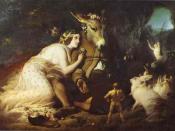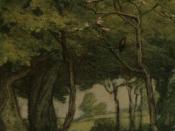Literature can reflect the human condition by presenting aspects of our existence, including the wide range of emotions, our mortality and the transformations which differentiate us as a species. Examples of texts which do so include the play Away by Michael Gow, the photo "Woman on Bondi" by Marco Bok and the poem "Ode To A Nightingale" by John Keats, which provide similar and contrasting views on these aspects of humanity.
Away by Michael Gow, first published in 1986, is an Australian play set in the 1960s, following the Vietnam War, which explores the mortality, loss, restoration and transformation experienced in our existence.
Gow suggests that Tom is the catalyst through his characterisation of Puck in "A Midsummer Night's Dream" in the opening scene. He alludes to Tom's role as a healer, as it is through his death that others are able to begin the process of restoration - "Give me your hands, if we be friends, and Robin shall restore amends", while adding elements of magic through the play-within-a-play.
Tom engineers the play's upheaval through the 'Puckish' curse - "I hope you have a rotten holiday" and by conjuring up the storm further into the text, which causes both great conflict and the restoration of the characters.
The mortality of our existence is also expressed through Tom. By reading the excerpt from "King Lear" in the final scene, Tom undergoes a cathartic transition, reflecting upon his foreshadowing death and finally accepting its inevitability - "while we unburden'd crawl towards death". Gow's casting of Tom as Lear insinuates that he has completed his role as the healer and is ready to face his destiny. Despite the tragic overtones conveyed through these lines, the concept of a new beginning is also implied through the stage directions and setting -...


